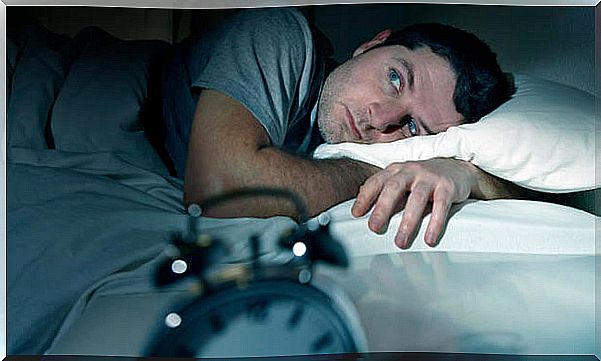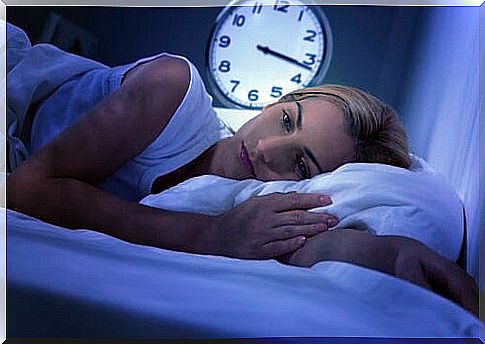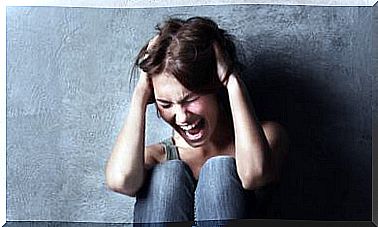Types Of Insomnia: Causes And Treatments

Often times when we have trouble sleeping we say we have insomnia, but did you know that there are different types of insomnia? That’s how it is. There is not just one type, but several and each of them requires a different treatment. In this article we will focus on explaining the different types of insomnia and the treatment that is recommended in each case. Let’s go deeper.
Insomnia is one of the most frequent reasons for consultation in primary care and also one of the symptoms shared by practically all psychological disorders.
As with other problems that are very common in our society (such as anxiety or depression), many people use the term insomnia incorrectly. For example, having trouble sleeping for a day or two is not having insomnia, or being very stressed and not being able to sleep properly would not be identified with this sleep disorder either. In the latter case, we would rather be under a stress process that has insomnia as a symptom.
As we can see, there are certain specifications that are essential to understand this problem, evaluate it and design the treatment. Let’s see each of these aspects below.

What is insomnia?
Insomnia is formally called primary insomnia, a sleep disorder in which the following characteristics are seen:
- For at least four weeks the person experiences persistent difficulty sleeping.
- Difficulty can be experienced during sleep initiation, maintenance, termination, or the feeling of unrefreshing sleep (sleeping but not resting).
- There is no organic (head injury, dementia, stroke) or medical / physiological cause that can explain the insomnia (drug use, medication, medical illness that leads to insomnia).
- There is also no psychological disorder such as anxiety or depression. Because in these cases we would be facing a diagnosis of anxiety disorder or another disorder (with symptoms of insomnia related to another mental disorder according to DSM-5).
Thus, there are three types of insomnia depending on when the person experiences difficulty sleeping:
- Conciliation or onset insomnia.
- Maintenance insomnia or fragmented sleep.
- Late insomnia or early awakening.
Therefore, to be able to say that we have insomnia (strictly speaking), it is necessary that we meet the diagnostic criteria described above. If we have another disorder or problem that causes insomnia, the mere treatment of the sleep disorder will not end the problem. The main disorder must be diagnosed and addressed in order to end sleep problems. Next we will delve into the three types of insomnia that exist.
Conciliation or onset insomnia
This is the most common and known of the three types of insomnia. It is about the inability to sleep when we go to bed, that is, a problem is experienced when initiating sleep. Conciliation insomnia is usually due to the maxim “we sleep as we live”. That is, if we spend the day stressed or worried, it is very difficult for the mind to disconnect and go into sleep mode.
In the vast majority of cases, conciliation insomnia responds to a state of psychological discomfort, which is responsible for the difficulty in falling asleep. However, problems starting to sleep can also be experienced when there are changes in the usual schedule of our routine or in the hours of exposure to sunlight.

Treatment of conciliation or onset insomnia
The recommended treatment for reconciliation insomnia has several phases. First, what is known as sleep hygiene is done. This approach is used because in most cases, with the development of insomnia, the person acquires habits that are not healthy and that make their situation even worse. In this way, as a first measure, some guidelines are worked out to have correct habits and break the association: going to bed → not sleeping → anticipatory anxiety about not sleeping.
Second, if sleep hygiene guidelines are not sufficient, different techniques or tasks are prescribed that seek to break the association between bedtime and not being able to sleep, along with the discomfort that this entails. For each case and person, the psychologist designs a specific task, and also raises a series of therapeutic objectives that seek to generate changes in their day-to-day life.
However, it is necessary to remember that all the therapeutic approaches that we have mentioned are aimed at conciliation insomnia as the primary disorder. That is, they are treatments and approaches that are designed in the event that other types of insomnia or psychological disorders such as anxiety, depression, obsessive compulsive disorder or bipolar disorder are ruled out.
On the other hand, if the person cannot sleep using psychological techniques, it may be necessary to resort to a drug. The best options for reconciling insomnia are non-benzodiazepine sleep inducers. They are drugs that act quickly and for a very short time, without anxiolytic or residual effect the day after. For example, zolpidem, zaleplon, or zopiclone.
In any case, the pharmacological treatment of insomnia always has to be prescribed and supervised by a doctor, who decides which drug is the most appropriate and for how long to take it.
Maintenance insomnia or fragmented sleep
In maintenance insomnia, there is difficulty staying asleep throughout the night. In other words, the person is able to fall asleep but experiences frequent and prolonged nocturnal awakenings that usually occur especially in the middle of the night. When this happens, the negative consequences are very noticeable, since you have the feeling of having a non-restorative sleep.
If the diagnosis of maintenance insomnia is made, it is essential to rule out organic or physiological causes that are responsible for the problem. For example, hormonal problems that make the person wake up. Awakenings during the middle of the night are very common when there is a malfunction of the thyroid gland or, in the case of women, when they experience irregularities in their hormonal cycle.

Treatment of maintenance insomnia or fragmented sleep
If medical causes are found to explain maintenance insomnia or fragmented sleep, these must be treated first. Once these causes have been controlled or ruled out, the treatment for this type of insomnia will involve all the techniques used in conciliation insomnia, but it must also include a pharmacological treatment.
In this case, the drug would be recommended acting benzodiazepine overnight, since s and need a drug that keep the person asleep during that time.
On the other hand, there is no effective psychological treatment to date that makes it possible to immediately reduce the number of nocturnal awakenings. However, the work of a psychologist in these cases is also essential.
Most people who have fragmented sleep or maintenance insomnia also have psychological problems such as anxiety disorders or major depressive disorder. With which, the first thing that is sought in the short term is for the person to be able to sleep properly, in order to then be able to work, through psychotherapy, all the psychological aspects that are the cause of this type of insomnia.
Late insomnia or early awakening
In the last of the types of insomnia, what happens is that the person is able to fall asleep and does not wake up during the night, but does not get all the hours he needs to sleep. For example, we set the alarm clock at 7:00 a.m. and woke up at 5:00 a.m. without being able to go back to sleep. This causes that the rest of the day we are more tired and even, feelings of anxiety or anguish.
This type of insomnia is closely associated with problems such as depression or job stress. First, depression involves a series of changes in sleep cycles that often result in a person waking up very early and unable to go back to sleep. And secondly, when there is a high workload, it is very common for the person to wake up earlier and not be able to go back to sleep.

Treatment of late insomnia or early awakening
Treatment of late insomnia consists of a combination of pharmacological treatment to prevent the person from waking up before the time and psychological treatment to manage the emotions that cause early awakening.
The psychological approach is similar to that used in the other two types of insomnia, but in this case it is essential to carry out an intervention aimed at managing stress and emotions related to awakening.
It is also very important, strangely enough, that if we wake up early and do not fall asleep, we get out of bed. This is important because increasing tiredness is one of the best remedies against insomnia, and in addition, in this way we break the association between being in bed and the feeling of anguish caused by not being able to sleep.
Thus, while in the case of conciliation insomnia the first-choice treatment is psychological, in the case of the other two types of insomnia (maintenance or late), a drug must be combined with psychological treatment.









